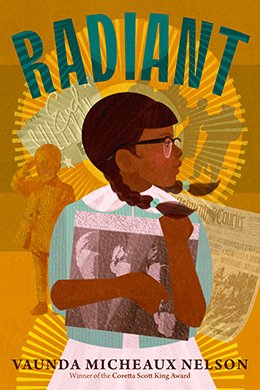Guest Post: Vaunda Micheaux Nelson on Her Verse Novel, Radiant
Vaunda Micheaux Nelson is part of the New Mexico writing group that has given me support, critique, and loving friendship for some 26 years. Now, Vaun has a new book out: Radiant, a verse novel written in the viewpoint of its young protagonist, Cooper. Here’s an excerpt from the publisher’s promotional copy:
As school begins in 1963, Cooper Dale wrestles with what it means to “shine” for a black girl in a predominantly white community near Pittsburgh. Set against the historic backdrop of the Birmingham church bombing, the Kennedy assassination, and Beatlemania, Radiant is a finely crafted novel in verse about race, class, faith, and finding your place in a loving family and a complicated world.
Cooper finds her own radiance and inner strength despite the fractures of the world around her and through a commingling of musical fandom, faith, and dawning social awareness. I was fortunate to see this work grow in small clusters of poems as they emerged from Vaun’s nurturing mind. So I’m thrilled to invite Vaunda Miecheaux Nelson here today to let us catch a glimpse of what it meant for her to write this book. Her reflections offer an insight into a writer’s relationship to her characters, even, or perhaps especially, the troubled ones:
“It’s been said, “Forgive and forget,” but is this truly possible? Often we forgive but can’t forget, which isn’t necessarily a bad thing. We can grow from not forgetting, from remembering.”
Now that Radiant is finished, I find myself wondering about my characters —what going forward might be for them now that they’ve experienced what I’ve put them through. We writers can be merciless when subjecting our characters to painful things.
Forgiveness is a key theme of Radiant. I hope both Cooper and Wade find peace through the changes that forgiveness (both giving and receiving) might bring.
It’s been said, “Forgive and forget,” but is this truly possible? Often we forgive but can’t forget, which isn’t necessarily a bad thing. We can grow from not forgetting, from remembering.
When we talk about forgiveness, we usually mean forgiving others. But what is even more challenging, I believe, is forgiving ourselves when we’ve behaved badly.
Both Cooper and Wade struggle to find their ways, but I wonder most about Wade. We spend the entire book inside Cooper, experiencing what she thinks and feels. Radiant is, after all, her story. We see Wade filtered through Cooper’s eyes and can only guess what he thinks and feels.
How might forgiveness manifest itself in him? Can he forgive himself? What kind of healing will occur after he walks off his last page of the book that brought him into being?
When Wade is 25, 40, 80, how will he remember his fifth-grade year? The year he found the part of himself he needed most.
What kind of man did he become? I care, just as a mother cares for the child she’s brought into this world. I forgive my boy, Wade, and wish him only good things.
For more on Radiant, in a couple more weeks, look for my conversation with Vaunda Micheaux Nelson and Tina Athaide on why each of them turned to the verse novel to tell a story from the past.
